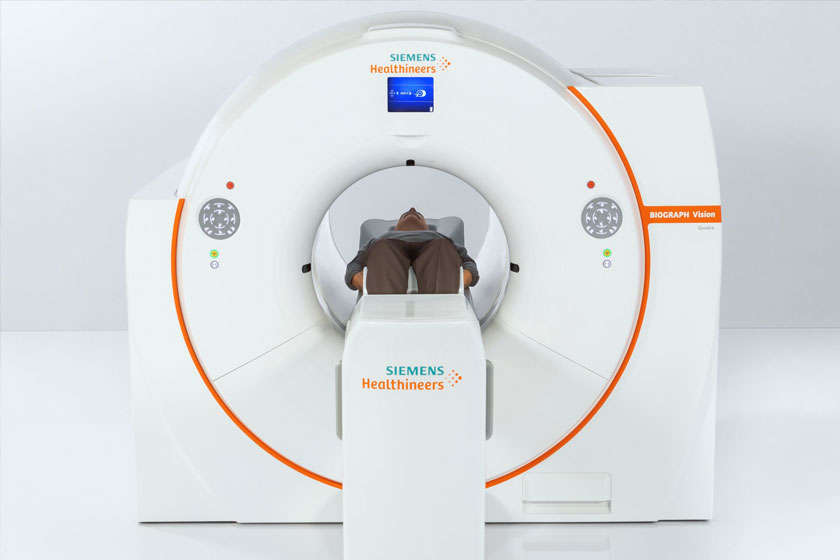
UK first as new scanner for cancer care comes to Royal Free London
26 January 2024
Cancer patients at the Royal Free London will be the first in the UK to benefit from a revolutionary new scanner which will deliver more accurate and faster diagnoses.
The £8 million positron emission tomography (PET) scanner, funded by the Royal Free Charity, is 30 times more powerful than standard machines and will allow scans of the whole body to be completed in a fraction of the time they do currently.
Because the scanner is more sensitive, it means patients will be exposed to less radiation and scans can be completed in a fraction of the time, increasing the speed of diagnoses and allowing life-saving treatments to start sooner.
PET scanners create three dimensional pictures of parts of the body. Patients are given a mildly radioactive glucose solution, which is then absorbed by the part of the body that doctors wish to look at. This radioactive material lights up in the scan, allowing doctors to see how the patient’s tumour or part of the body is functioning.
For patients with cancer, understanding more about how a tumour functions means patients can received more appropriate and effective treatments.
The PET scan is used as part of a suite of diagnostic tools that help doctors determine the best treatment for each patient.
The new PET scanner is called a long axial field of view or LAFOV. It is also known as a Total Body PET scanner. Because it is 30 times as sensitive as the trust’s current scanner, it allows clinicians to take an image in a much shorter length of time.
The Royal Free London hosts one of the busiest cancer services in the NHS, receiving almost 50,000 referrals each year and cancer care forms a key pillar of the trust’s clinical strategy.
Once the new equipment is up and running, it will speed up scanning time from 30 to five minutes, freeing up capacity to see more patients in a matter of days of referral, rather than weeks.
The scanner will also be a huge boost for research at the Royal Free London, dramatically widening the pool of volunteers eligible for vital trials.
This is because the LAFOV machine can take scans which deliver a much smaller dose of radiation to participants. It means that healthy volunteers can be scanned as part of a trial aimed at understanding more about how internal organs function.
The scanner will be installed at the Royal Free Hospital this weekend and will be operational in early Spring. The project will cost a total of £14 million.
Peter Landstrom, chief executive of the Royal Free London, said: “This is brilliant news for cancer treatment and research in London and beyond.
“Estimates suggest that by 2040 one person every minute will be diagnosed with cancer – and that means more and more patients requiring NHS care.
“We have one of the largest cancer services in the country and the Total Body PET scanner will allow us to make better and faster diagnoses as well as taking our understanding of this devastating condition to another level.
“I would like to say a huge thank you to the Royal Free Charity, and its generous donors, for making this possible.”
Roopinder Gillmore, divisional director for medical specialties, added: “This is wonderful news for the trust and for all our patients. We are delighted that our patients can now receive their diagnoses sooner and as oncologists we have much more detailed information about a patient’s tumour – allowing us to give them more effective treatment.”
Jon Spiers, chief executive, Royal Free Charity, said: “The UK is grappling with one of the highest rates of late cancer diagnosis among developed nations and the demand for cancer care in North London is projected to surge in coming years.
“Against this backdrop, our role as the Royal Free London’s NHS charity partner is more crucial than ever before. By securing funding that would otherwise not be available, we’re directly enabling an increase in cancer diagnostic capacity and speed.
“We’re extremely grateful to the Biss Davies Charitable Trust, Garfield Weston Foundation and Goldman Sachs Gives for their generous contributions to this project. Along with the support of countless individuals and community groups, we’re helping the trust to go further and faster than it could do with NHS funding alone.”
Lead photo: courtesy Royal Free London NHS Foundation Trust.



